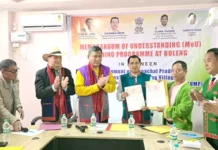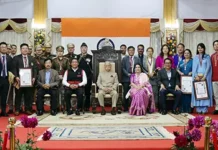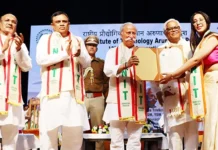Monday Musing
[ Bengia Ajum ]
As the Tibetan spiritual leader, His Holiness the Dalai Lama, turned 90 on 6 July, China once again expressed displeasure over India hosting him. A Chinese foreign ministry official made it clear that his continued presence in India is straining relations between the two countries. The Dalai Lama arrived in India in 1959, and has since been living in Dharamshala, Himachal Pradesh.
As he celebrated his birthday, politicians in Arunachal Pradesh voiced support for Tibet and the Dalai Lama. Chief Minister Pema Khandu emphasized that India shares a boundary with Tibet, not China. MP Tapir Gao called for global recognition of the Dalai Lama’s institution and its right to choose his successor, amid China’s claims that it alone has approval rights. Minority Affairs Minister Kiren Rijiju asserted that only the established institution and the Dalai Lama himself can decide on his incarnation, not any external party. However, the Ministry of External Affairs (MEA) clarified that India takes no position on such religious matters. Rijiju later explained that his remarks were made as “a follower and devotee.”
Arunachal Pradesh shares a long-disputed boundary with China, and provocative anti-China remarks by local politicians can complicate matters. The central government, led by Prime Minister Narendra Modi, has by contrast been cautious when addressing India-China issues. Even after the Galwan clash, which resulted in casualties on both sides in eastern Ladakh, Indian leadership maintained composure without issuing provocative statements. Moreover, India has already signed an agreement recognizing Tibet as part of China.
During ‘Operation Sindoor’, residents near the Indo-Pak boarder in Punjab and Jammu & Kashmir suffered the most. In the 1962 Sino-India war, people of Arunachal Pradesh again bore the brunt. The Arunachali politicians should therefore exercise caution when speaking on sensitive matters like India-China relations. One misstep could further damage already strained ties. Foreign policy issues are the prerogative of the MEA. In this case, too, the MEA had to step in and clarify that the Indian government takes no position on the Dalai Lama succession issue.
In the coming years, the conflict between the Dalai Lama and China over his successor is expected to intensify. While China says it will decide the successor, the Dalai Lama has made it clear that the Gaden Phodrang Trust, an institution he founded, will be solely responsible for identifying his successor. Arunachali politicians should be mindful when making any statement on the issue and let the MEA handle it.
Relations between India and China have deteriorated since the Galwan incident. A tense calm prevails along the McMahon Line, which separates the two nations. A single wrong move could further jeopardize bilateral ties. Diplomacy should prevail over jingoism.



